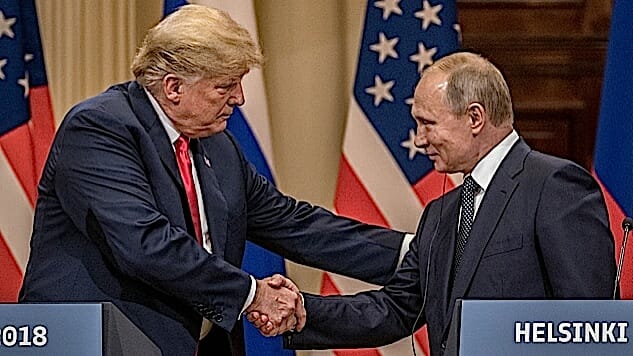Russiagate Off the Rails
Photo courtesy of Getty
It’s been a crazy week in Russiagate news.
Anticipation and anxiety were high leading into Monday’s Helsinki meeting between President Trump and Russian President Vladimir Putin. In the days leading up to the summit, FBI special counsel Robert Mueller had announced the indictments of 12 Russian nationals as part of his ongoing investigation into alleged interference in the 2016 election. Trump made things worse by announcing ahead of time that the scheduled rendezvous, requested by Putin, would be held in private with only translators present. Further fanning the skepticism, he had attended the NATO summit and demanded that member countries pony up more money for defense, and in a separate visit with Queen Elizabeth II of England, had broken protocol. Not one to read the room, just hours before the summit, the president tweeted that the U.S. bore the lion’s share of the blame for strained relations with Russia, prompting a Twitter meltdown during which #TreasonSummit began trending.
At the press conference after the meeting, Trump did little to assuage concerns about his relationship with the Russian President. Asked directly whether he trusted the consensus from the U.S. intelligence community that Russia had indeed meddled in the 2016 election, the president demurred, turning to his counterpart, and expressing his admiration and trust for him in plain English.
“I have great confidence in my intelligence people, but I will tell you that President Putin was extremely strong and powerful in his denial today,” Trump said before denying any collusion between his campaign and Russia.
Naturally, all hell broke loose—again. #Treason started trending on Twitter; CNN’s Chris Cuomo declared the U.S. had “hit bottom,” calling Trump’s performance a “cowardly display of self-interest”; Vox called the meeting “geopolitical suicide”; New York published a piece by staff writer and Russiagate enthusiast nonpareil Jonathan Chait titled, “At Summit With Russia, Trump Betrays His Country in Plain Sight”; Senate Minority Leader Chuck Schumer (D-NY) hinted publicly that the “only explanation” could be that Putin has “damaging information” on Trump; former CIA Director John Brennan tweeted that the president’s actions were “treasonous”; the Washington Post ran an article titled, “We just watched a U.S. president acting on behalf of a hostile power.” Topping all these off, Politico ran an op-ed dubbing the 2016 hacking of the DNC and Clinton campaign, “Our Pearl Harbor.”
By Tuesday, Trump had walked back his rejection of the American intelligence community, claiming that he’d misspoken when he told reporters he saw “no reason why it would be Russia” behind the hacking. “I said the word ‘would’ instead of ‘wouldn’t,’” he declared. “The sentence should have been, ‘I don’t see any reason why it wouldn’t be Russia.’” The announcement was welcomed but met with widespread skepticism.
Then on Wednesday, details of the discussion between Trump and Putin emerged, presenting the country with fresh new horrors. As it turns out, the Russian president had offered to allow American prosecutors to sit in on the interrogations of the 12 Russian nationals accused of involvement in the 2016 election meddling, in exchange for allowing Russian prosecutors to interrogate 11 Americans in connection with alleged financial crimes committed by American born financier William Browder, a British citizen. In addition to Browder, former U.S. ambassador to Moscow, Michael McFaul, one of the key proponents of the devastating US-backed neoliberal shock therapy in Russia during the 90’s, was named as a person of interest. Trump, White House spokesperson Sarah Huckabee Sanders said, was “considering” what Trump had dubbed an “incredible offer” in Helsinki—the proposal to assist in the potential prosecution of an American diplomat.
The former ambassador took to Twitter, castigating the president and claiming that Putin was “intimidating” him. Before long, #ProtectMcFaul was trending, and a new round of declaring Trump “treasonous” and a “traitor” had begun. Rep. Eric Swalwell (D-CA) told CNN that should the president acquiesce to Putin’s unprecedented request it would be grounds for impeachment. And indeed, the fact that Trump even seemed to consider the idea (even though it was totally unrealistic from the start, likely even from Putin’s perspective), is quite troubling—despite the fact that it wasn’t ever going to happen. Later that night, Twitter worked itself into yet another frenzy over a New York Times report that Trump had known about Russian interference weeks before his inauguration. The hashtag #TrumpKnew was trending.
However, despite the pearl clutching, by Thursday afternoon, very little had changed for either the U.S. or Russia. Michael McFaul remained safely planted on American soil, Putin’s proposal was rejected as was always going to happen; America’s alliances, including NATO, remained intact; the defense budget would still surely see a massive boost in the next fiscal next year; the $380 million Congress had appropriated to the states to shore up election security was still very much available (as of June, 26 states had registered to take advantage of the aid); the recently imposed sanctions against Russia hadn’t been lifted; the Mueller probe continued. On the other hand, Russia remained comparatively isolated, its economy still largely dependent on oil in the face of emerging green energy
Even so, when the president announced he was inviting Putin to Washington, more outrage ensued.
The whole week was a stark reminder that Russiagate has erupted into full blown hysteria. Terms like “act of war,” “treason,” “traitor,” and “active measures” have worked their way into the heart of mainstream journalism with the aid of vainglorious intelligence retirees, stoking the fires of xenophobia. When Center For American Progress head Neera Tanden called Deutsche Bank “Russia infested” last week, her followers barely batted an eye, apparently having become so numb to such rhetoric.
-

-

-

-

-

-

-

-

-

-

-

-

-

-

-

-

-

-

-

-

-

-

-

-

-

-

-

-

-

-

-

-

-

-

-

-

-

-

-

-








































